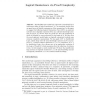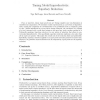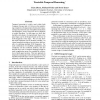7 search results - page 1 / 2 » Logical Omniscience Via Proof Complexity |
CSL
2006
Springer
13 years 8 months ago
2006
Springer
The Hintikka-style modal logic approach to knowledge has a well-known defect of logical omniscience, i.e., an unrealistic feature that an agent knows all logical consequences of he...
TARK
2009
Springer
13 years 11 months ago
2009
Springer
The logical omniscience feature assumes that an epistemic agent knows all logical consequences of her assumptions. This paper offers a general theoretical framework that views log...
TPHOL
1999
IEEE
13 years 9 months ago
1999
IEEE
Abstract. We describe the key features of the proof description language of Declare, an experimental theorem prover for higher order logic. We take a somewhat radical approach to p...
CORR
2008
Springer
13 years 5 months ago
2008
Springer
Pure, or type-free, Linear Logic proof nets are Turing complete once cut-elimination is5 considered as computation. We introduce modal impredicativity as a new form of impredicati...
IJCAI
2007
13 years 6 months ago
2007
Temporal reasoning is widely used within both Computer Science and A.I. However, the underlying complexity of temporal proof in discrete temporal logics has led to the use of simp...



